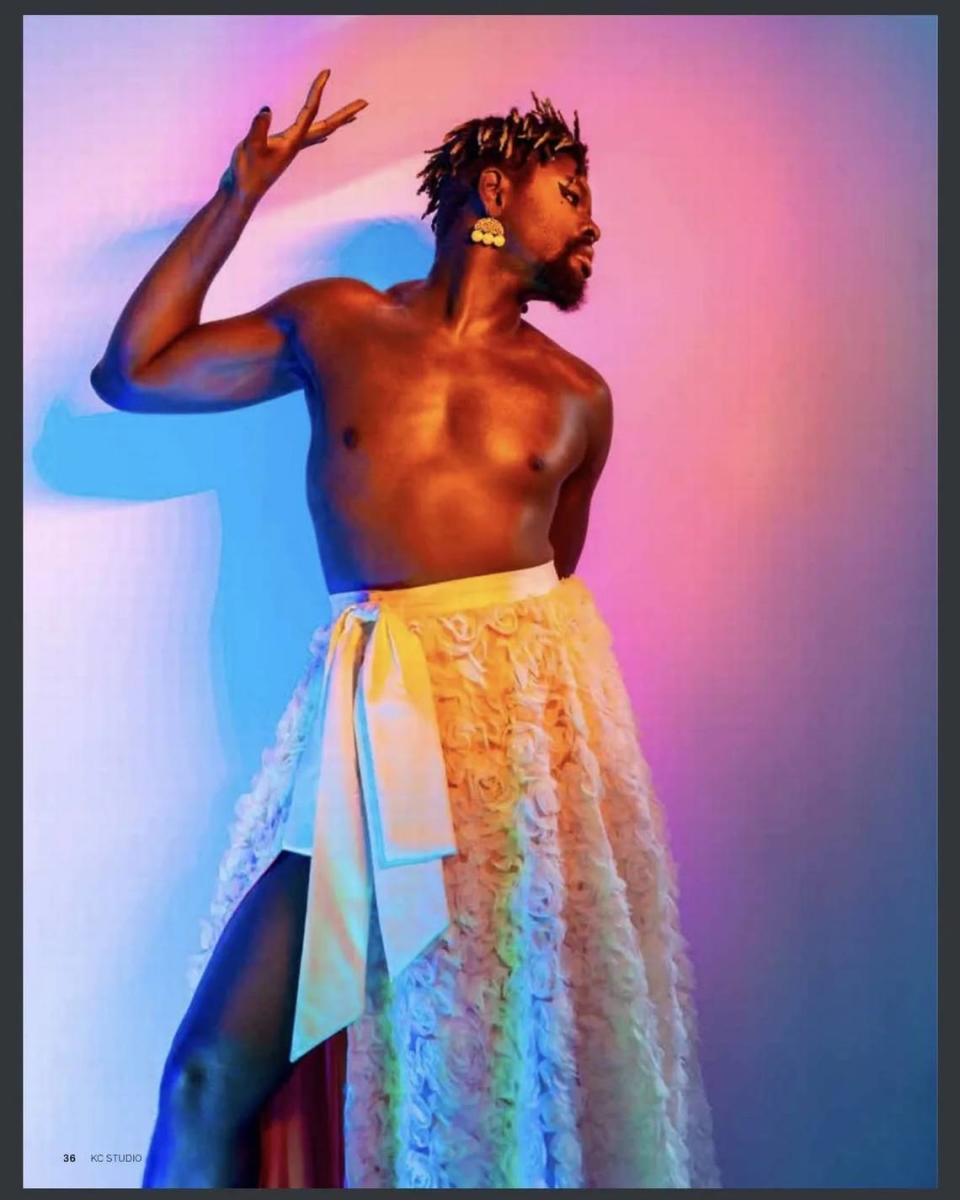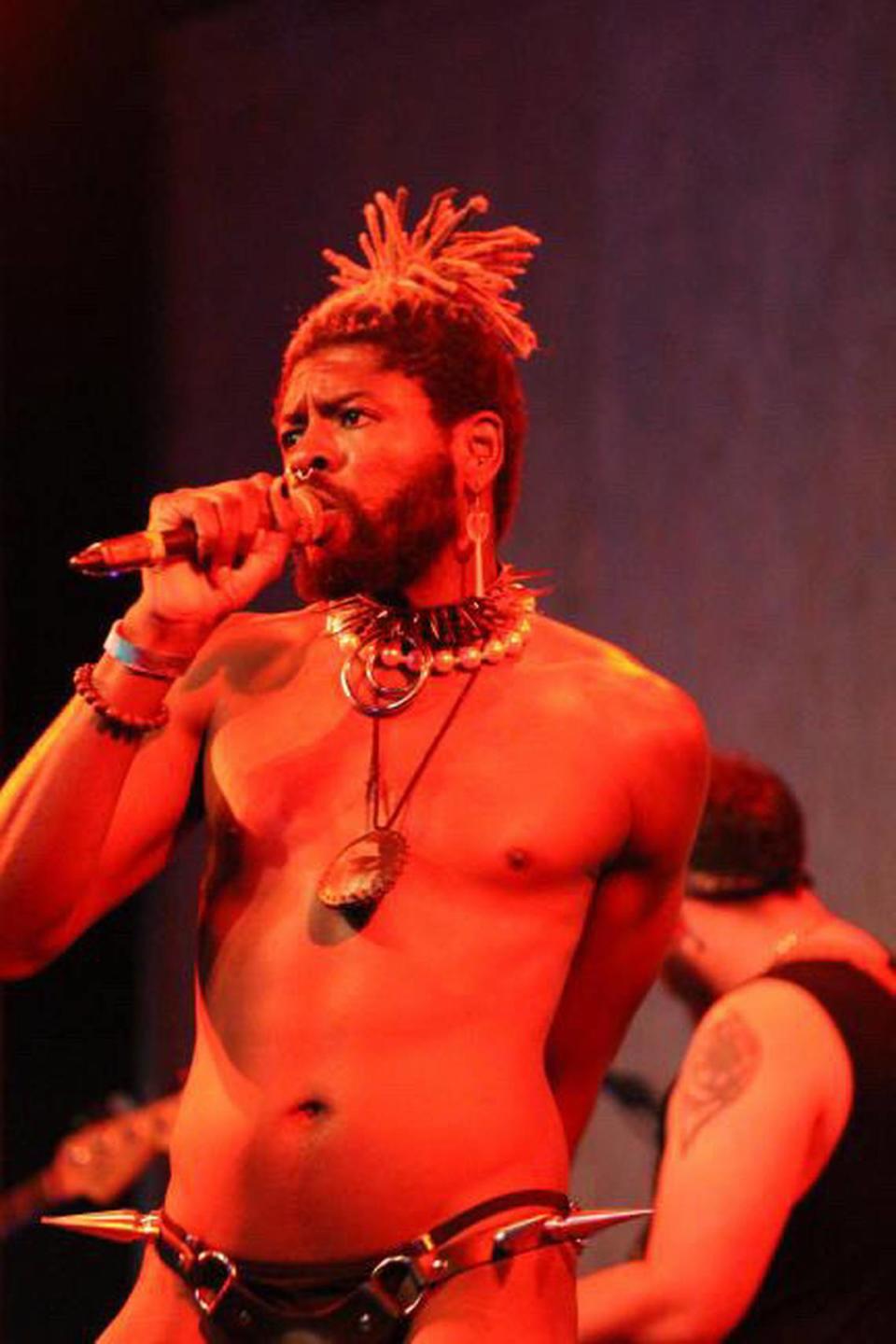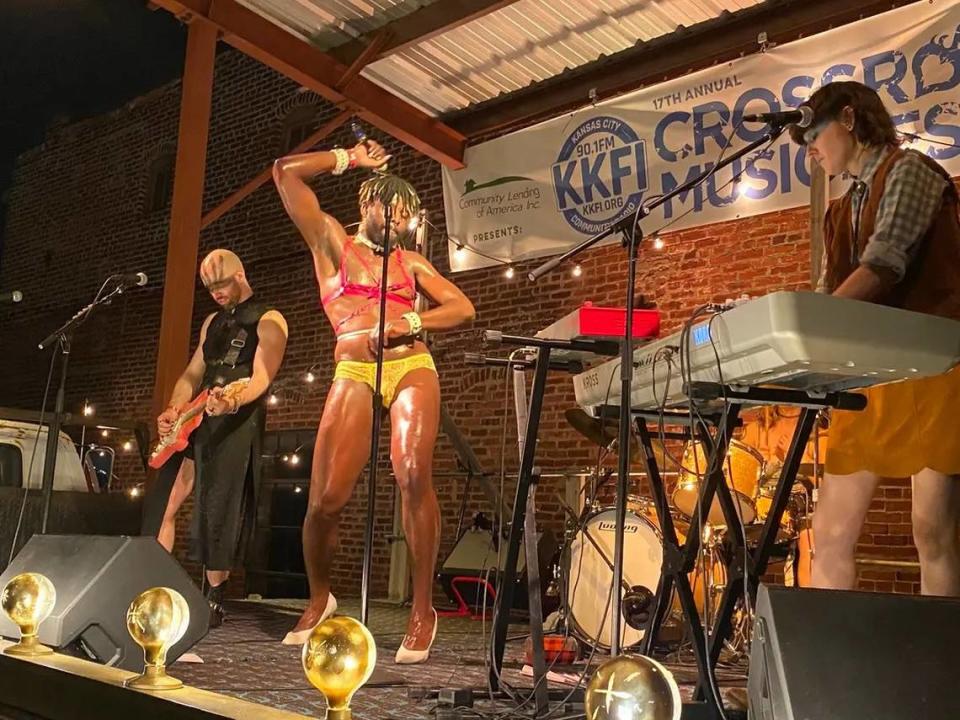This Kansas City musician is Black, gender-fluid and beloved. ‘I want to inspire’
When Stephonne Singleton steps on stage for any given show, the responses are usually the same: Some gasp, some cheer and others remain silent, unsure of what to say, do or feel.
Singleton might be wearing thigh-high leather boots, metal spikes, lingerie or close to nothing at all. On stage is where the Wyandotte County native thinks they are the most comfortable.
“I think it’s time,” says Singleton, who uses they/them pronouns. “It is a time for the freaks, weirdos and the outcasts of marginalized groups to shine and be free.”
They identify as gender fluid, and their music style is fluid as well, mixing hip-hop, R&B, rock and folk to create a sound distinctly their own. They faced multiple obstacles before the singer-songwriter could find their voice.
Singleton grew up in a strict Catholic family in the inner city. The feeling of being an outsider both racially and religiously caused years of confusion, conflict and struggles with mental health.
“I had at least three suicide attempts as a teenager because of the stuff I’ve gone through, but I didn’t have any tools because my parents didn’t believe in therapy,” they said.
Singleton may have the onstage presence of someone who is completely confident in their skin, though their early years growing up in the Black community were tough. Remembering the strict historical confines of what it meant to be a Black man, Singleton felt trapped in a cultural prison that did not encourage experimentation or exploration.
“In the hood you are expected to be this very strong masculine, unbothered, hold your head up high kind of man,” they said. “‘You don’t let nothing get to you’ sort of mentality, and when you show any kind of emotion or vulnerability, it is seen as feminine and considered weakness.”
Kim Newsome met Singleton in 2013 when the two were performing in the music group My Brothers and My Sisters. Intrigued by Singleton’s style and charisma, she knew they were something new and exciting for the Black music scene in KC.
“Their voice was so unique and very eclectic,” says Newsome. “I’ve never seen or heard anybody like them ever and just very confident in who they were.”

Always more interested in fashion, art and music than sports, Singleton knew they were out of the ordinary. Being raised in the ’90s and early 2000s with hip-hop and R&B, no artists told the Black queer story.
“For me it was really, really hard growing up because I always felt different and we didn’t have the language or acceptance that we have now to really sort that out or know what that meant,” says Singleton. “The community still isn’t comfortable with queerness, homosexuality, gender norms and the expansion of those ideas, structures and constructs.”
It was not until the past decade that the hip-hop and R&B scenes saw artists like Frank Ocean, Young M.A and Lil Nas X arrive to disrupt the dogmas of gender and sexuality. Singleton is thankful to help normalize being different and breaking the taboos of what it means to be a Black musician.
“I am ready for us to be loud and angry and I’m ready for Black people to see trans Black people and queer Black people as Black people,” says Singleton, who by day works at a cannabis dispensary. “It is only then we can really come together and embrace the complex nuances of the African diaspora.”
Although Singleton’s parents did not initially support them as they figured out their own complicated relationship with gender and sexuality, the 36-year-old is thankful their parents exposed them to music, with legends like Tina Turner, Michael Jackson and Whitney Houston playing.
“The way my parents communicated was through music because they weren’t the best at talking to each other,” says the singer. “Music was always there and it was such a source of comfort but also an escape from the world so many times.”
Feeling a disconnect with the popular music of the time, they began to explore rock ’n’ roll. The melancholy lyrics and dark chords of bands like Nirvana, Hole and Alice in Chains opened Singleton to a new world of music, one that reflected the isolation they felt.
“I have always had this very rebellious rock spirit,” says Singleton. “I remember the first time I saw the video for ‘Smells Like Teen Spirit’ on the screen and I would listen to the radio and I was always attracted to more than just hip-hop and R&B.”
Singleton began writing their own songs to express feelings they couldn’t talk about before. Finding a sense of safety and release for the first time, though not performing yet, Singleton decided to pursue a career and education in music.

After graduating from Bishop Ward High School, Singleton earned a bachelor’s degree in music at Benedictine College, a Catholic school in Atchison, and went on to earn a master’s degree in music and entertainment business from Full Sail University.
Singleton began their career performing at open mics and singing for local bands. Still unable to book steady gigs, they began to second-guess their dream. In 2011 Singleton took a chance at a friend’s insistence and started to compete in drag shows at Missie B’s, developing a colorful, over the top persona with a flair that remains today.
For the first time in their life, Singleton could tap into the feminine and explore their gender.
“All of that stuff was me exploring who I was just as a person,” says Singleton, who performed under the name Kita Rose in drag shows. “That’s been my journey with myself, gender identity, music, writing and presentation. Just an exploration.”
In 2014 Singleton began funneling every extra dollar into their music. It would not be until 2018 that they released their first album, “Caged Bird Sings Songs About Red Beard.” The name reflects the feelings of confinement and the need to take flight from their brutish captors. The album was an unapologetic declaration of Singleton’s pain, struggle and survival.
“I went places where I never allowed myself to go before as far as the darkness of life and of love,” says Singleton. “I was just finding myself and experimenting. Figuring out what freedom felt and sounded like.”
Since then, Singleton has lived an uncaged life, making music and choices with the determination of someone looking to break down the limits they feel Black and queer artists are bound by. In 2022, Singleton released their latest EP, “SIS: Side B” a collection of high-energy, uptempo music, a departure from the emotionally heavy debut album.
For the past year Singleton has arranged tribute shows for musical greats who influenced them such as Jill Scott and Eryka Badu, bringing together talented up-and-coming local acts. Singleton believes the KC music scene is in a critical time with artists needing to band together to build rather than segregate the different styles Kansas City is home to.
Newsome, a singer, is also the host of the Kimology podcast, where she talks to local Black musicians. She interviewed Singleton on her show three years ago and has a tremendous respect for the obstacles they have endured looking for acceptance within their own community.
“It seems there is more acceptance for women who are within the queer community that embrace masculinity more so than the other way around,” says Newsome, 36. “There are so many layers to it, but I definitely feel like toxic masculinity has everything to do with it and there are still people in the community that feel like there is this stereotype of what a Black man must be in music.”
Believing Singleton to be the breath of fresh air that the KC urban core needs, Newsome sees their tribute shows as a perfect opportunity to bring everyone together, drawing talent from R&B, soul, jazz and funk artists.
“I love having the opportunity to sing with people I never thought I would be on stage with,” says Newsome, who has performed at all three previous tribute shows. “Artists like Stephonne who are bringing people together within the scene and building these bridges are needed because you feel the love and respect onstage.”
“The music scene in KC is so divided into sectors,” says Singleton. “I think that once we embrace our differences we realize that they don’t separate us but they actually just make us more interesting and give us more character.”
Singleton is thankful for the emergence of trailblazing acts like fellow Wyandotte native Janelle Monae, who disrupts the norms of Black gender identity and sexuality. As an artist who wants their music to be shared by everyone, they know there will still be those who choose to judge based off appearance rather than talent.
Currently working on their third album, Singleton knows it will take time to open the minds of people who look at them and see something odd or taboo. They hope their music will touch others struggling to find their own truth.
“I want to inspire people to just get up and believe in themselves and their power,” says Singleton. “Their power to own their narrative and to be who they are and not who people expect them to be.”

Singleton’s next performances
▪ Kat King’s Zombie Prom, 7 p.m. Oct. 13, The Ship, 1221 Union Ave.
▪ 2023 Gala Dada Fun House, 7 p.m. Oct. 21, Charlotte Street Campus, 3633 Wyoming St.

